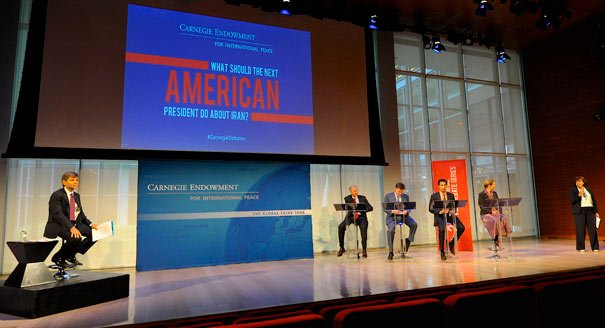Registration
You will receive an email confirming your registration.
George Stephanopoulos moderated an interactive debate with Dennis Ross, Anne-Marie Slaughter, Bret Stephens, and Carnegie’s Karim Sadjadpour. This debate, the first in a three-part series sponsored by the Carnegie Endowment, focused on one of the key issues in this year’s election—What should the next American president do about Iran?
Options for U.S. Policy
The debate was structured around four proposed options for U.S. policy under the next president: a military strike, intensified sanctions, intensified negotiations, and the present course.
- Audience Poll: A poll of audience members was conducted at the beginning of the debate. A clear majority, 62.1 percent, supported intensified negotiations, while 13.7 percent supported intensified sanctions, another 13.7 percent supported the present course, and 10.5 percent supported the option of a military strike.
- Prevention, Not Containment: Ross did not explicitly favor any of the options, instead arguing that there needs to be ‘prevention, not containment.’ He said that both President Obama and Governor Romney believed in prevention.
- A Credible Threat of Force: Ross added that while Iran is feeling the pressure from sanctions, the threat of force needs to be more credible in Iranian eyes. He asserted that there is no military solution, but rather that force can be one means to help achieve U.S. aims. Stephens disagreed, arguing that he was beginning to believe that the only way Iran could be stopped is through military force. The United States can’t brandish the sword of a military threat if it isn’t prepared to use it, Stephens asserted.
- Consequences of a Military Strike: Sadjadpour warned that while a military strike could set back Iran’s nuclear weapons threshold by three years, it could also extend the life of the regime by another decade, or even another generation. Slaughter added that the United States needs Iranian engagement on other U.S. interests like Afghanistan and Syria, and warned that the use of force against Iran could have a wide range of negative impacts. Stephens countered those arguments, pointing to the examples of Argentina and Serbia, where political leaderships were toppled soon after military defeat in the Falklands and Kosovo respectively.
- Give Diplomacy Teeth: Ross asserted that diplomacy needs to be conducted in such a way that Iran loses more if it fails, and suggested that the end goal for diplomacy would be permitting restricted civil nuclear power in Iran.
- Carrots as Well as Sticks: Slaughter argued that there is a good case for intensified negotiations, but that the United States needs to be willing to make concessions to come to the table, agreeing with Ross that the United States should allow Iran the right to develop civil nuclear power capabilities.
- A Liberal Question: Stephens added that liberals should be concerned by the danger posed by a potential nuclear Iran. A regime prepared to stone a woman to death should not be allowed nuclear arms, he stated. Slaughter challenged him, saying that was not a sufficient pretext for military intervention.
- Likelihood of a Nuclear Weapon: The audience was asked whether Iran will acquire a nuclear bomb within the next decade. A slight majority, 52.2 percent, said no. Slaughter ventured that Iran will not develop a bomb given previous Israeli attacks in Iraq and Syria, and the fact that U.S. credibility is at stake when it ultimately comes to it.
Perspective from Iran
- Deliberate Progress: Sadjadpour argued that Iran is deliberately driving at “30 mph rather than 100 mph” toward nuclear weapons. Slaughter agreed, arguing that U.S. intelligence indicates that the Iranian regime wants to be close to having the ability to build a nuclear weapon, but that it has not decided on taking the final step.
- Two Different Irans: It is important to differentiate between the Iranian nation and the Iranian regime, Sadjadpour added. The regime sees itself as engaged in an ideological cause against the United States and Israel.
- The Supreme Leader’s Fatwa: The fatwa by Ayatollah Khamenei describing the acquisition of nuclear weapons as a sin provoked discussion among the debaters. Ross described the fatwa as being primarily for an external audience, but suggested optimistically that it could also be used as a rationale for the leadership to justify a possible negotiated compromise.
- An Expensive Program: Sadjadpour added that the nuclear program was very costly and that it was not a priority for ordinary Iranians facing immediate financial challenges.
A Democratic Future for Iran?
- Audience Poll: Stephanopoulos polled the audience as to whether they believed Iran will become a democracy in the next decade. A majority, 63.7 percent, said it would not, while 36.3 percent believed it would.
- Impact of a Military Strike: Slaughter suggested that if there is no military strike against Iran then the country will become a more representative democracy over the next decade.
Regional Action
- Israeli Strike: Several of the debaters agreed that a lone Israeli military strike would be the worst possible option, and if military action is taken, there should be U.S. involvement. However, Ross added that even an Israeli strike on its own would likely set the Iranian program back by four or five years.
- Expand Outreach: Sadjadpour suggested that one way to promote diplomacy would be using satellite television and expanding on the success of products like the BBC Persian service in penetrating Iran.
The debate concluded with the initial question being polled again. While intensified negotiations remained the favored policy choice, albeit at a slightly lower figure of 58.9 percent, there was a 1.5 percent increase in those favoring a military strike, a five percent increase in those favoring intensified sanctions, and a three percent decrease in those favoring the present course.
